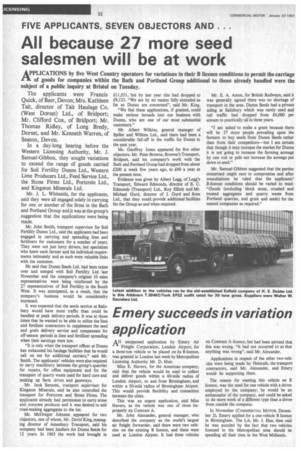All because 27 more seed salesmen will be at work
Page 34

If you've noticed an error in this article please click here to report it so we can fix it.
NPLICATIONS by five West Country operators for variations in their B licence conditions to permit the carriage of goods for companies within the Bath and Portland Group additional to those already handled were the subject of a public inquiry at Bristol on Tuesday.
The applicants were Francis Quick, of Beer, Devon; Mrs. Kathleen Tait, director of Tait Haulage Co. (West Dorset) Ltd., of Bridport; Mr. Clifford Cox, of Bridport; Mr. Thomas Ridley, of Long Bredy, Dorset, and Mr. Kenneth Warren, of Seaton, Devon.
In a day-long hearing before the Western Licensing Authority, Mr. J. Samuel-Gibbon, they sought variations to extend the range of goods carried for Soil Fertility Dunns Ltd., Western Lime Producers Ltd., Feed Service Ltd., the Stone Firms Ltd., Portcrete Ltd., and Kingston Minerals Ltd.
Mr. J. L. Whiteside, for the applicants, said they were all engaged solely in carrying for one or another of the firms in the Bath and Portland Group andit was at the group's suggestion that the applications were being made.
Mr. John Smith, transport supervisor for Soil Fertility Dunns Ltd., said the applicants had been engaged in carrying and spreading lime and fertilizers for customers for a number of years. They were not just lorry drivers, but specialists who knew each farmer and his individual requirements intimately and as such were valuable links with the customer.
He said that Dunns Seeds Ltd. had been taken over and merged with Soil Fertility Ltd. last November and the company's original 10 sales representatives were being reinforced by the 27 representatives of Soil Fertility in the South West. It was anticipated, as a result, that the company's business would be considerably increased.
It was expected that the seeds section at Salisbury would have more traffic than could be handled at peak delivery periods. It was at those times that he wanted to be able to utilize the lime and fertilizer contractors to supplement the seed and grain delivery service and compensate for off-season periods in lime and fertilizer spreading when their earnings were low.
"It is only when the transport officer at Dunns has exhausted his haulage facilities that he would call on me for additional carriers," said Mr. Smith. The applicants' vehicles were also required to carry machinery between the group's quarries for repairs, for office equipment and for the transport of quarry waste used for hard core and making up farm drives and gateways.
Mr. Jack Sansom, transport supervisor for Kingston Minerals, said he also controlled the transport for Portcrete and Stone Firms. The applicants already had permission to carry stone and concrete products and it was desired to add road-making aggregates to the list.
Mr. McGregor Johnson appeared for two objectors, one of whom, Mr. David King, managing director of Amesbury Transport, said his company had been hauliers for Dunns Seeds for 12 years. In 1965 the work had brought in 1,551, but by last year this had dropped to 19,123. "We are by no means fully extended as far as Dunns are concerned", said Mr. King.
"We feel these applications, if granted, could make serious inroads into our business with Dunns, who are one of our most substantial customers."
Mr. Albert Wilkins, general manager of Spiller and Wilkins Ltd., said there had been a considerable fall-off in the traffic for Dunns in the past year.
Mr. Geoffrey Jones appeared for five other objectors. Mr. Peter Browne, Browne's Transport, Bridport, said his company's work with the Bath and Portland Group had dropped from about £200 a week five years ago, to £40 a year at the present time.
Evidence was given by Albert Legg, of Legg's Transport, Edward Edmonds, director of E. C. Edmonds (Transport) Ltd., Roy Elliott and Mr. Michael Gurd, director of J. Gurd and Sons Ltd., that they could provide additional facilities for the Group as and when required. Mr. E. A. Aston, for British Railways, said it was generally agreed there was no shortage of transport in the area. Dunns Seeds had a private siding at Salisbury which was rarely used and rail traffic had dropped from £4.000 per annum to practically nil in three years.
"I am asked to make a grant because there will be 27 more people prevailing upon the farmers to buy seeds from Dunns Seeds rather than from their competitors—but I am certain that though it may increase the market for Dunns it is not going to increase the farming acreage by one rod or pole nor increase the acreage put down to seed."
Mr. Samuel-Gibbon suggested that the parties concerned might care to compromise and after consultations he ruled that the applicants' B-licence conditions should be varied to read: "Goods (excluding block stone, crushed and treated aggregates and quarry waste from Portland quarries, and grain and seeds) for the named companies as required."




























































































































